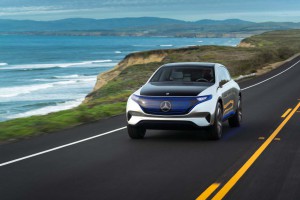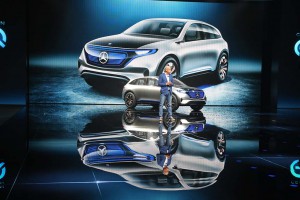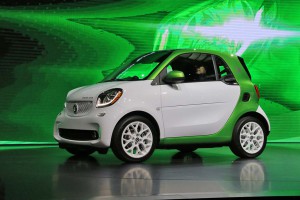Daimler AG, the parent of the Mercedes-Benz and Smart brands, plans to accelerate its battery-electric vehicle program and now plans to have at least 10 BEVs on the market by 2022, about three years ahead of its earlier target.
The move was announced by Daimler CEO Dieter Zetsche during the automaker’s annual meeting in Berlin on Wednesday, and will require an investment currently estimated at around $11 billion. The decision to speed up the program comes as Daimler’s Mercedes brand struggles to meet strict new European CO2 emissions targets.
“We attach high priority to responsible mobility across the entire value chain,” said Daimler board member and research chief Ola Kallenius. “We are continuing to systematically promote the issue of sustainability through targeted investments in environmental projects in the development and production of our vehicles.”
(Mercedes to reveal major update of S-Class at NY Auto Show. Click Here for a preview.)
In 2016 alone, Kallenius revealed, Daimler spent over 3 billion euros, or about $3.23 billion at current exchange rates, on sustainable mobility. Along with pure battery-electric vehicles, Daimler is also expanding its line-up of both conventional and plug-in hybrid vehicles, while also developing hydrogen fuel-cell vehicles.
Though a break-out has not been revealed, the German maker announced the creation of an all-new battery-electric sub-brand, dubbed Mercedes-EQ, during the Paris Motor Show last September. That move echoes a strategy taken by several German rivals. BMW currently sells two vehicles under the BMW i marque, while Volkswagen is creating the I.D. badge for more mainstream BEV models now under development.
But virtually every luxury automaker is now working on electrification. Audi plans to have an all-battery SUV model, comparable to its newly updated Q5, on the market by 2018. Even Aston Martin is plugging in, with a battery-electric version of its four-door sports sedan model to be called the RapidE.
Mercedes showed off a prototype of a battery-powered, midsize luxury sedan at the Paris show, calling it the Generation EQ. A production version is expected to be one of, if not the first, Mercedes-EQ products. At the time, Zetsche said it would go on sale late in the decade.
As with most of the new luxury electrics, Mercedes is believed to be focusing on longer range than first-generation battery cars. That would run north of 200 miles and could push towards 400 with anticipated improvements in lithium-ion technology. Costs for LIon cells have dropped by as much as 85% since the beginning of the decade, to around $150 per kilowatt-hour, and many experts are betting it will reach the $100 mark by the end of the decade.
“The emission-free automobile is the future,” Zetsche said during a Paris news conference, adding that Mercedes will also load those new vehicles up with the latest in connected-car technology and semi-autonomous and, perhaps, even fully autonomous systems.
(New Mercedes S550e will be the first plug-in hybrid you won’t have to plug in. Click Here for more on the new, wireless charging technology.)
Under the skin the Generation EQ concept – and future production Mercedes-EQ models – blended a lightweight, multi-material mix of steel, aluminum and even carbon fiber. Automakers across the globe are racing to lightweight their vehicles, and composites are one of the Holy Grails. Rival BMW has gone so far as to set up the world’s largest carbon fiber factory in Washington State to supply its electric vehicle sub-brand.
The push to cleaner powertrain technology is not entirely altruistic. Automakers are facing increasingly strict emissions and fuel efficiency regulations in key markets like Europe, China and Japan – though U.S. Pres. Donald Trump has signaled he will back off on the aggressive mileage mandates set under the administration of his predecessor, Barack Obama.
The German maker is struggling to meet the CO2 mandates set in Europe, where global warming is a primary concern for regulators. A major reason has been rising demand for utility vehicles and shrinking sales for more efficient sedans and coupes.
The European target is a fleet average of 95 grams or less of CO2 per kilometer by 2020. Mercedes had dropped its emissions numbers for seven consecutive years but they held flat in 2016 at 123 grams. Experts have warned that without the introduction of new, alternative powertrains, luxury makers – and even a number of mainstream manufacturers – could miss the 2020 targets.
(Daimler’s Smart will only sell battery-electric models in the U.S. going forward. Click Here for the full story.)




It looks like Mercedes is using what they learned in F1 racing.